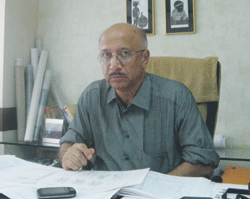With rapid urbanisation and the real estate and infrastructure sectors buzzing, the demand for civil engineers has skyrocketed with glamour returning to the profession
In the golden age of engineering (1960-70), civil engineering was one of the most popular specialisations of Indian youth. But with the onset of the IT (information technology) revolution of the 1990s, this branch of engineering took a backseat with its bricks and mortar subject losing appeal to computers and clicks. However with rapid urbanisation, the real estate sector buzzing, and infrastructure boom a reality, this hardy perennial elective is back again as the new frontier of aspirant engineers with the demand for civil engineers skyrocketing and glamour returning to the profession.
Industry estimates indicate that India is confronted with a shortage of over 70,000 civil engineers every year. Hardly surprising, since a mere 10 percent of IIT students opt to study this subject and only 200 of the 1,700 engineering colleges approved by the All India Council for Technical Education (AICTE) offer this study programme. The annual pan-India output of civil engineers is estimated at a mere 10,000 per year.
Civil engineering involves planning, designing and executing infrastructure projects. Civil engineers design, supervise, construct and execute public work projects such as roads, bridges, tunnels, airports, dams, waterworks, sewage systems, ports etc. The major specialisations in this field are infrastructure, water resources, environ-ment, construction, transportation, geo-technical engineering etc.
A bachelor’s degree in civil engineering is the minimum qualification required to enter this profession. Most engineering colleges offer four-year BE/B.Tech study programmes in civil engineering after Plus Two, or three-year diploma programmes after completion of secondary school (class X).
The seven Indian Institutes of Technology (IITs) at New Delhi, Mumbai, Guwahati, Kanpur, Kharagpur, Madras and Roorkee are the most prestigious engineering education institutions in India. The number of IITs is slated to increase this year with new institutes in Hyderabad, Patna, Roorkee, Gandhi-nagar, Punjab and Bhubaneshwar becoming operational thus increasing the number of engineering seats. Among other highly rated engineering colleges offering civil engineering certification are the Birla Institutes of Technology (BITS) at Pilani and Ranchi; Delhi College of Engineering; University of Roorkee and numerous regional engineering colleges (now known as National Institutes of Technology) in different states. Then there is the option of Associate Membership of the Institute of Engineers (AMIE) which enables diploma holders in private and public sector companies to acquire a bachelor’s engineering degree through distance education.
Massive infrastructure investment and real estate development have placed a premium on professionally qualified civil engineers. Among the major employers are the state and Central governments, Indian Railways, airports, private construction companies, military engineering services and consultancies. Civil engineering graduates can also opt for research and teaching jobs or start independent consultancies.
Another new specialisation is that of chartered engineer. A civil engineer can enroll with the Institute of Chartered and Works Accountancy (ICWA) to qualify as a chartered engineer and command sky-high remuneration. The Middle East and Gulf emirates in particular, with their massive construction and infrastructure spending are proven El Dorados of civil engineers. Construction conglomerates such as L&T and Shapoorji Pallonji recruit directly from campuses at start-up salaries of Rs.15,000-20,000 per month. IIT-Bombay graduates are routinely signed up at Rs.5 lakh plus per annum. In the emirates, fresh engineers start with Rs.22,000-25,000 per month excluding the cost of residential accommodation.
 “In the 1980s the main growth in construction was in Mumbai and other metros. Today, there’s a boom in second tier cities across the country. Moreover construction projects in the Middle East draw large numbers of Indian civil engineers. Hence, there’s a tremendous shortage, and I foresee the demand for qualified and semi-qualified civil engineers continuing for at least another 15-20 years,” opines Uday Chande, proprietor of U.D. Chande, consulting engineers, surveyors and valuers, a company which has an annual sales turnover of Rs.1.5 crore and has grown more than 300 percent in the past eight years.
“In the 1980s the main growth in construction was in Mumbai and other metros. Today, there’s a boom in second tier cities across the country. Moreover construction projects in the Middle East draw large numbers of Indian civil engineers. Hence, there’s a tremendous shortage, and I foresee the demand for qualified and semi-qualified civil engineers continuing for at least another 15-20 years,” opines Uday Chande, proprietor of U.D. Chande, consulting engineers, surveyors and valuers, a company which has an annual sales turnover of Rs.1.5 crore and has grown more than 300 percent in the past eight years.
A civil engineering graduate of M.S. University, Baroda with a Masters in structural engineering from the University of Florida, Chande worked for two years in the US, acquiring specialisation in roads and bridges. In 1972 he returned to India to join the consulting engineering company founded by his father. “Construction and infrastructure play a key role in economic development and nation building. Based as it is on the fundamentals of the science of engineering, civil engineering is timeless and society will always require great builders. As a career choice, it’s more appropriate today than ever before. That’s my advice to promising graduates,” says Chande.
Indra Gidwani (Mumbai)